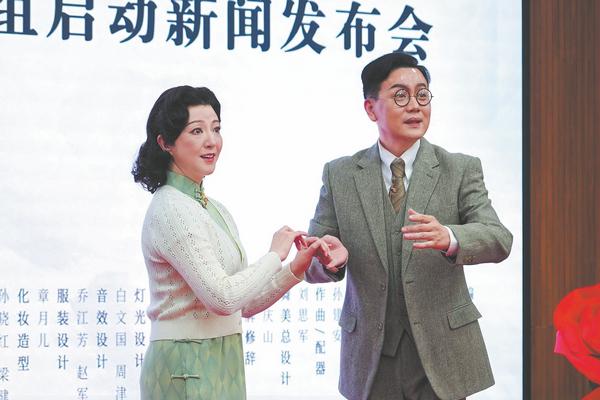
 0 Comment(s)
0 Comment(s) Print
Print E-mail China Daily, August 17, 2024
E-mail China Daily, August 17, 2024

Kunqu Opera performers Wei Chunrong (left), who plays the role of Li Pei, and Yuan Guoliang, who plays the role of Guo Yonghuai, perform an excerpt from the Kunqu Opera production Li Pei in Beijing on Aug 10. [Photo/China Daily]
The Northern Kunqu Opera Theatre's latest contemporary production, Li Pei, which is about the famous applied linguist, will premiere at the Tianqiao Performing Arts Center in Beijing on Sept 20.
According to Yang Fengyi, president of the theater, the production is a compelling tribute to Li's remarkable life and legacy, and reflects her resilience, groundbreaking achievements as an educator, and her story with her husband, Guo Yonghuai (1909-68), one of the founding fathers of China's atomic and hydrogen bomb, and satellite programs.
Born in Jiangsu province in 1917, Li was admitted to Peking University to study economics in 1936. She continued her studies at Cornell University in the United States in 1947, where she married Guo in 1948. The couple returned to China with their only daughter in 1956. Li passed away in 2017.
Li began teaching English at the University of Science and Technology of China in 1961, and transferred to its graduate school in 1978. Later renamed the University of Chinese Academy of Sciences, she remained at the graduate school until she retired in 1987.
Besides being an educator and linguist, Li is also credited with being one of the most important initiators and promoters of the development of Zhongguancun, which later became the high-tech innovation hub that has been dubbed "the Silicon Valley of China". She also set up the Zhongguancun Forum, and invited eminent scholars from many fields to give lectures, arranging more than 600 between 1998 and 2011.
"Besides Li's professional life, which established her as a formidable figure in her own right, the production also depicts her family life, from her romance with her husband to her life after his death," says Yang.
Guo was the first dean of the chemical physics department at the University of Science and Technology of China. A pioneer of modern Chinese mechanics, he made great contributions to mechanics, applied mathematics and aeronautics and died in a plane crash in 1968, at the age of 59.
"Li was not only a pioneer educator but also a wife and mother, who coped with the devastating loss of her husband, and later of her only daughter, who died in 1997," says Gong Yingtian, director and scriptwriter of the opera that follows Li's story over the course of 80 years.
More than 600 years old and one of the oldest traditional forms of opera still in vogue in China, Kunqu Opera is performed in the Suzhou dialect, and is known for its graceful movements and dance. It has captured hearts of fans with its seemingly endless variety of gestures used to express specific emotions and in 2008, it was inscribed on UNESCO's list of the intangible cultural heritage of humanity.
"There are over 90 performers in the production. We also combine elements such as choral singing, narration and symphonic music, with Kunqu Opera," adds Gong.
One of the theater's leading performers is Wei Chunrong, who will play the role of Li.
"This is the first time for me to play a role in a contemporary Kunqu Opera production, and it's challenging since it is based on a real story. I did a lot of research on Li's life," says Wei, who started to study the ancient art form when she was 10, and has been performing with the Northern Kunqu Opera Theatre since she was 16.
As a winner of the Chinese Theatre Plum Blossom Award, the top national performing arts award, Wei is mostly known for her roles as classic Chinese beauties like Du Liniang in The Peony Pavilion and Cui Yingying in The Romance of the West Chamber.
"Most of the roles I have played are of beautiful, soft and sentimental women. Many have been portrayed by Kunqu Opera actresses in different generations. For Li Pei, I had to put aside all my experiences with other female roles and start afresh," Wei says.
Yang Jia, one of Li's students, is also portrayed in the production. She studied under Li after being admitted to pursue her master's degree at the University of Chinese Academy of Sciences at the age of 22. Two years later, she became a teacher at the university, and at 29, lost her sight. With Li's encouragement and a great deal of determination, Yang Jia became the first blind person from outside the US to obtain a master's degree in public administration from Harvard University.
"I can still recall the first time I met Li when I was interviewed for entry to the University of Chinese Academy of Sciences some 30 years ago. Her smile was so heartwarming," says Yang. "I was lucky to have been her student. She was a great woman who inspired me."
Go to Forum >>0 Comment(s)